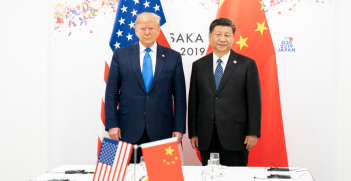COVID-19 and Global Sport

The Novak Djokovic vaccination and visa scandal has turned the world’s attention to both celebrity privilege and public safety and wellbeing. While many have focused on the specifics of this case, it is important to dig deeper into the impact of COVID-19 on sport, from elite to grassroots levels.
The entire world was turned on its head when the COVID-19 pandemic began in the first half of 2020. Key sporting events, like the United Kingdom’s annual golfing championship, the Open Championship, were cancelled — while others, such as the US Masters Tournament, were moved from spring to autumn. Clubs and organisations lost billions of dollars due to pandemic cancellations. The decision to cancel the US college basketball tournament, March Madness, cost universities US$375 million in lost revenues. Top level clubs and franchises in major leagues were able to survive due to lucrative television contracts, and — once play resumed — were able to help mitigate some of the losses of revenue from spectators attending matches. When soccer matches resumed in four of the five main leagues in Europe by July 2020, matches were played in empty stadia, though fan chanting was piped over the airways to resemble a match-day atmosphere for spectators watching on television or via streaming.
Changes in the management, marketing, and presentation of sports continue to evolve, and the pandemic has completely shut down global, traditional sporting competitions. The French soccer leagues abandoned their seasons and declared final positions based on their performance to date. Other major leagues resumed play after a couple of months of shutdown, though playing to empty stadia. In the US, the National Hockey League and the National Basketball Association completed their playoffs in late September and early October for seasons usually completed by June. The National Football League and the National Collegiate Athletic Association (NCAA) College Football returned to competition in September with mixed results, and some matches had to be cancelled due to positive COVID-19 tests. Despite this, some stadia in the USA were allowing 20,000 or more spectators.
The European soccer season for 2020-2021 began almost as soon as the previous season ended, though still without spectators in the stadium. Several early season results demonstrated that COVID-19 has created tremendous disruption, but has also potentially levelled the playing field. As we complete this article, Aston Villa defeated Liverpool 7-2 on the same day Tottenham conquered Manchester United 6-1. Bayern Munich and Dortmund, favourites expected to dominate the Bundesliga in Germany, both lost early matches. The French Open, played in late September and early October, was rife with upsets. In the 2022 Autumn Internationals for rugby, the lack of international competition for the New Zealand Black Ferns women’s rugby team showed as they were easily defeated by England and France, as the latter had continued participating in international competitions.
The Olympic Games for Tokyo 2020 and the Women’s Rugby World Cup for Aotearoa/New Zealand for 2021 were both delayed a year. Even in 2021, the Olympics were held without spectators. The same is holding true for the February 2022 Beijing Winter Olympics. The 2021 Summer Games went true to form with the top countries remaining at the top, though the year difference clearly challenged some athletes.
The sports which are linked to the “business world” remained largely unaffected in Australia. Australian greyhound and horse racing never ceased. The major football codes also completed seasons. “Project Apollo” — the restarting of the National Rugby League competition in 2020 — provides a poignant example of this. The COVID-19 pandemic claimed many victims, but Australian commercial sport did much better than — for example — the arts. However, this relative commercial success and broadcasting of sport was often specific to elite male sporting events, and only heavily sponsored and advertised sports were sustained. They survived the two years of the pandemic, but other programs related to diversity were axed. Physical education and grassroots sports suffered as well.
As a result of COVID-19, many more marginal sports organisations have lost revenue and were threatened with bankruptcy. Governments have scrambled to assist. In Scotland, financial tax relief was aimed at helping the country’s tourism and leisure industries hurt by the economic downturn from the pandemic. Controversially, one beneficiary was former American President Donald Trump, who received more than a million dollars of taxpayer money to support his two Scottish golf resorts, though he was forbidden from receiving such aid in the US due to his role in government.
eSports and related events are rapidly expanding industry sectors. In particular, the eSports market is getting bigger and better due to COVID-19. Its unique structure and attributes, such as ubiquitous but individual-driven components, have led more people to eSports competitions. While mass eSports events have suffered, virtual events are much easier to operate than for other “sport” forms.
Magnifying Inequalities
The COVID-19 crisis created an unprecedented disruption of sport around the globe. However, its impact is not evenly dispersed. Experts and activists are raising the alarm — sport for girls and women, sport in low and middle-income countries, and sport for people with disabilities will suffer disproportionately.
The International Working Group on Women and Sport, the world’s largest network committed to empowering girls and women in sport, released a Call to Action. They declared the pandemic a “threat” to progress for gender equality in sport and called for leaders around the globe to devote resources to protecting opportunities for girls and women. Other leading voices, such as Women in Sport and the Women Win foundation echoed this call. Across these groups, a top concern is that sport for girls and women will suffer from lack of resources in the long term, as struggling sport organisations are more likely to support sport for boys and men.
Women Win, a globally connected sport for development organisation, specifically focused on the detrimental impact of the crisis on adolescent girls in low and middle-income countries. Reaching thousands of teens and tweens each year in more than 30 different sport for development programs across the Global South, Women Win raises awareness for concerns over increased gender-based violence and the potential harm for girls kept out of school long after an immediate crisis is passed.
In elite sport, the effects are already becoming clearer. This spring, the Telegraph in London ran a series of stories of women athletes explaining how the crisis has impacted their sport. Another report from the Telegraph detailed how women’s sport was being “abandoned,” while men’s sport was restarting. The Digital, Culture, Media and Sport Committee of the UK Parliament reported that women’s professional sport leagues and events — football, cycling and rugby — were being cancelled, while corresponding men’s leagues were running. The report called for leaders in sport to protect women’s sport and highlighted an overall lack of diversity in sport leadership. The strategy for change includes upending existing business models to “reset,” shifting sport leagues toward more diverse representation. Experts and activists have also called for governments to step in to protect women’s sport.
Challenges, disruptions, and the halting of sport competitions alongside the emergence of new sport forms and ways of thinking about sport mean that the world of sport we knew in 2019 may not be the same in 2022. As we come out of the COVID-19 crisis we must work to reshape sport as we reshape our world, address climate change, and promote social justice and inclusion. We must continue to ask who sport serves and for what purposes. We need to ensure we develop sustainable sporting cultures that benefit public health and wellbeing, in addition to serving spectators and elite sports teams and competitions. Meanwhile, those competitions should also create sustainability and fair competition between clubs within leagues — or across nations — competing in global sport.
Dr John Nauright is Dean of the Richard J. Bolte School of Business at Mount St. Mary’s University in the USA. He is a leading expert on global sport and global sport politics. He also directs the Global Rugby Leadership Institute. He has authored and edited many award-winning works including The Political Economy of Sport; Global Markets and Global Impact of Sports; Sport in Australasian Society; and Sports Around the World. His previous work on cricket includes analysis of the Hansie Cronje match-fixing crisis; cricket in South Africa; cricket in the Caribbean and on cricket boycotts during apartheid. He is a dual Australian – US citizen. He is also visiting professor at the University of the West Indies, Cave Hill in Barbados.
Dr Sarah Zipp is the Deputy Programme Director for Sport Studies (undergraduate) and teaches on the Master’s in Sport Management at Stirling. Her research and teaching explores issues of social justice and leadership in sport, including gender equality, sport for development, globalization, ethics and environmental concerns.
Dr Steve Georgakis is Senior Lecturer of Sport Studies and Pedagogy at the University of Sydney. A former schoolboy representative player, he now promotes cricket at the grassroots and provides media comment on cricketing issues.
This article is published under a Creative Commons Licence, and may be republished with attribution.





